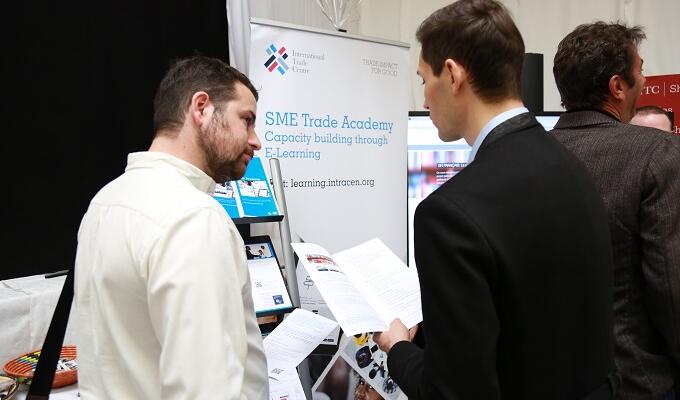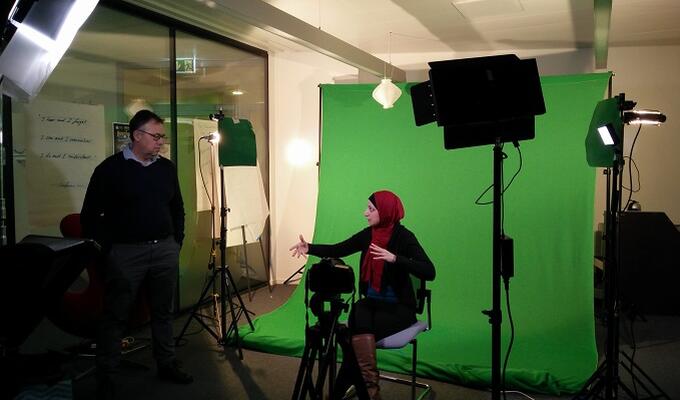


Engaging youth through virtual learning spaces
The SME Trade Academy is allowing ITC to extend its reach in developing and least developed countries
The International Trade Centre’s (ITC) SME Trade Academy has developed 55 online courses since its creation in 2014 in a range of topics tailored to the needs of developing countries. Offered free of charge on the Academy’s platform, these courses have enabled ITC to dramatically extend its reach to traditionally underserved areas.
In fact, for nearly half of the SME Trade Academy’s course participants, interaction with ITC is their first online learning experience. What’s more, almost a quarter of them have taken more than one course on the platform, demonstrating the current appetite for online learning in least developed countries (LDCs) and other developing countries. With over 21,000 new enrolments expected for 2018, over 85% of which are expected to come from developing countries and LDCs, ITC has been successful in using the online medium to extend both the reach and the scale of its training activities.
Perhaps unsurprisingly given its online nature, young people have been among the most enthusiastic adopters of the SME Trade Academy. Indeed, 53% of participants on the Academy are below 35 years of age. With a number of courses specifically targeting typical youth profiles, such as students, graduates and early career professionals, the platform has enabled ITC to provide young people across the world with new training opportunities. Developing additional youth-focused content is also a major priority for the Academy.
‘I learned a lot and it was very helpful,’ says Lamin Jammeh, a 32-year-old entrepreneur working in the construction sector in the Gambia who completed three of the Academy’s youth-focused courses. ‘The courses are really intended to empower youth and give them a chance to showcase their talent in ways that can help them innovate more ideas. The Gambia is a youthful country and unfortunately not all of us can work in the field for which we studied. I would like to suggest that there be additional courses for youth on the platform.’
As part of its drive to continue empowering youth in LDCs and other developing countries, the SME Trade Academy is currently introducing a new approach to online training: Virtual Learning Spaces (VLSs).
Incorporating the latest innovation in online training, including micro-learning, comprehensive mobile access and xAPIs, VLSs are online platforms designed to provide a space for learners to form communities of practice around a particular topic or geographical area. They aim to increase the impact of ITC online learning activities by moving from time-bound courses, with defined start and end dates, to a continuous learning model. In practice this means learners will have permanent access not just to formal online training, but also to on-demand resources. These include short videos, audio clips, documents, quizzes and surveys, as well as a series of discussion groups overseen by moderators and organized around particular themes. This will make ITC’s online training offering more modular, flexible, responsive and, importantly, sensitive to local needs.
The concept of ‘community, in context’ is central to the success of the VLS model. Because a VLS relies on participant interactions to promote dynamic learning, the first step to ensuring its success is to focus the scope of its content, whether geographic, thematic or otherwise. Within this context youth has emerged as one of the cornerstones of the SME Trade Academy’s efforts and the first VLS created by ITC will be focused specifically on that group. The SME Trade Academy team is currently preparing to release a VLS tailored for young Libyan entrepreneurs in the final quarter of 2018, with another aimed at professional training for young people in Guinea to follow shortly after.
Another important aspect to community building involves promoting links between the VLS and various offline activities. Particularly successful or dynamic online learners could, for example, be rewarded for their efforts by an invitation to an offline workshop, conference, or training session. In this way VLS can broaden their communities beyond the online environment.
Finally, VLS will also promote the creation of user-made content. While the SME Trade Academy will continue to provide technical support, monitor quality and develop new courses, successful learners will be granted the ability to upload resources and create new discussion topics on the platform. This will enable VLS to evolve with their users over time, thus ensuring the creation of a long-term online community that will be reflective of the needs and interests of the people from which it is made.



